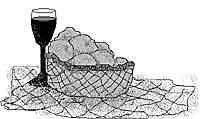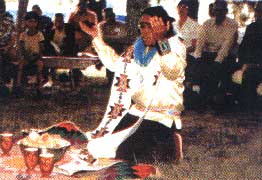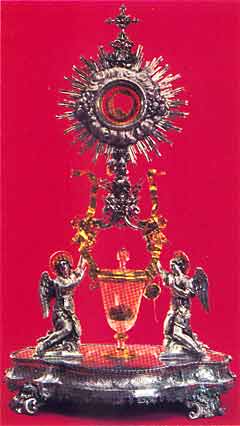

![]()
![]()
|
Newsletter of the District of Asia July-August 1999 In February 1972, a 400-page book was printed in Spain containing the advice given to the catechists of the Neo-Catechumenal Movement by Kiko Arguello and Carmen Hernandez, in charge of this Movement. This is an exceptional document revealing the reality of this association. 
the
This book is reserved to the catechists of the Movement and nobody else can acquire it. It became known, thanks to an indiscretion. The secret character of the advice given is often repeated in the book: “Don’t tell this to anybody else… If people knew this, they would go away quickly…” This is very surprising for a Movement which pretends to be Catholic. It seems, on the opposite, to be a kind of freemasonry. But let us go further. “Traditional Christianism, with Baptism, First Communion, Sunday Mass, Commandments of God, was not a Christianism. It was dirt. We were pre-Christians.(…) God called us now to found a catechumen Movement turned towards rebirth (of real Christianism)”. Ignoring and rejecting 2000 years of Catholic doctrine and practice of the Church, the Neo-Catechumenal way claims to rediscover the primitive and authentic Christian values. In this book, we can find at least six important points of that which is Catholic which was destroyed by this Movement. I. LUTHERAN CONCEPT OF SALVATION
The central point of the doctrine of Luther is that we can be saved without good works inspired by prayer, penance and charity. Faith alone is sufficient. This faith is essentially a confidence that God forgives sins because of Jesus Christ. As a consequence, the sacrament of penance is useless. (Dictionary of the Catholic Faith, D’Ales, Vol 4, p. 794, article: Reformation). In the book of Kiko and Carmen, we read: “Man is not saved by good works (…), Jesus Christ did not come to give us a model of life, an example (…). The Holy Spirit doesn’t lead us to perfection, to good works (…), Christianism doesn’t require anything from us (…). God forgives freely the sins of those who believe that Jesus is the Savior.” Here, it is very clear! In another place, they write that good works are the “signs of faith”, and that they are not Protestant. There is, however, such a great insistence that faith alone is essentially sufficient, that we could say that their doctrine on salvation is Protestant. In the Catholic Doctrine, good works are not only signs, but necessary means for salvation. II. DENIAL OF REDEMPTION In the Catholic Doctrine, the Passion of Our Lord Jesus Christ was the cause of our salvation because, having been an exact reparation for all our sins, it was the price of our salvation, according to the plan of God: “For you have been bought with a great price.” (I Cor vi, 20). Kiko and Carmen write: “The notion of sacrifice entered in the Eucharist by condescension for the pagan mentality (of this time). (…) But does God need the Blood of His Son in order to be appeased?” And they explain that “by his Resurrection, Jesus showed us His Will to forgive us.” But it is no more His sacrifice of the Cross which obtained our forgiveness: “Because of the Theological renewal of Second Vatican Council, today, the dogma of Redemption is no more spoken of, but rather, the mystery of the Pasch of Jesus.” We answer that no council of the Catholic Church can change its infallible doctrine! The doctrine of the Catholic Church is that the Sacrifice of Our Lord is together a Mystery of Justice and Love: the Divine Wisdom which was not obliged to require an exact reparation for our sins, but who chose this means to show us the gravity of sin1; the infinite love of God makes reparation in our place by the Second Person of the Holy Trinity having taken our nature; infinite love of the Son of God offering Himself on the Cross for the glory of his Father and our salvation; his esteem for His Son giving him such a difficult mission and rewarding Him by the gift of a name above all names. (Dictionary of the Catholic Faith – Article: Redemption. Summa of St. Thomas Aquinas: Treaty of the Passion) III. DENIAL OF CONFESSION For Kiko and Carmen, to think that “the essential of confession consists in confessing our own sins in order to receive absolution is a magic and an individualistic conception of this sacrament, where it is a man who forgives our sins.” For them the importance of this sacrament is not the absolution because we are already forgiven in Jesus Christ; but it is the community of the Church which is the sign of Jesus Christ and which forgives (!). Kiko and Carmen forgot these words of Our Lord Jesus Christ: “Whatsoever thou shalt bind upon earth, it shall be bound also in heaven; and whatsoever thou shalt loose on earth, it shall be loosed also in heaven (Matthew XVI, 19)”. Our Lord spoke to His Apostles and successors (bishops and priests) and not to the community of the faithful!
IV. DENIAL OF THE SACRIFICE OF EUCHARIST The Mass, for Kiko and Carmen, is only “the memorial of the Pasch of Jesus, of his passage from death to life”, and again: “The notion of sacrifice is a condescension for the pagan mentality (…). At the beginning of the Church, in the Theology of the Mass, there was no sacrifice of Jesus, no sacrifice of the Cross, no Calvary, but only a sacrifice of praise.” This is a typical Protestant conception of the Mass. Let us quote here some canons of the Council of Trent (22nd Session): “If anyone say that in the Mass, a true and real sacrifice is not offered to God (…), let him be anathema (Canon 1). If anyone says that the sacrifice of the Mass is that only of praise and thanksgiving, or that it is a mere commemoration of the sacrifice consummated on the Cross but not a propitiatory one [that is, a sacrifice to appease God – ed.] (…) let him be anathema (Canon 3).” V. DENIAL OF THE REAL PRESENCE Kiko and Carmen ridicule the traditional practices of the Catholic Church: “the tabernacles, the Feast of Corpus Christi, the solemn expositions of the Blessed Sacrament, processions, adorations, genuflections, visits to the Blessed Sacrament, to think that by communion we put Jesus in our soul, thanksgiving after communion, private Masses without faithful (…) all these practices minimize the Eucharist and are far from the spirit of Easter.” But, what really is important for them? “The most important thing does not consist in the Real Presence of Jesus Christ in the Eucharist, but in the Eucharist as it is the mystery of the Pasch (…). As God was present in the first Pasch, when the Hebrew fled from Egypt, so Jesus is present by his spirit, resurrected from the dead.” To this unusual and strange definition of the Presence of Jesus in the Eucharist, dangerously similar to the Protestant doctrine, let us quote the definition given by the Catechism of Saint Pius X: “The Holy Eucharist is a sacrament in which, by the marvelous conversion of the whole substance of bread into the body of Jesus Christ, and that of wine into His Precious Blood, is contained truly, really and substantially, the Body, the Blood, the soul and Divinity of the same Lord Jesus Christ under the appearance of bread and wine.” VI. DENIAL OF THE RESURRECTION Kiko and Carmen write: “The memorial Jesus left us in His resurrected Spirit from the dead (…). How did the Apostles see Jesus Christ resurrected? In themselves, made a vivifying spirit.” Kiko and Carmen forgot that in the Catholic Church, when it is spoken of the Resurrection of Our Lord Jesus Christ, it is the resurrection of His Body. In its commentary on the Creed, the Catechism of the Council of Trent writes: “On the morning of the third day after His death, the soul of Jesus Christ was reunited to His Body, and thus He who was dead during those three days arose, and returned again to life from which He had departed when dying.” Kiko and Carmen forgot that the Resurrection of Our Lord Jesus Christ is a dogma of our Faith: “If Christ be not risen again, then is our preaching vain, and your faith is also vain.” (I Cor. xv, 14) PAPAL APPROBATION In October 1990, “Thirty days” magazine ran as a headline: “Green light for the Neo-Catechumens. John Paul II praises the Neo-Catechumenal Way.” Perhaps, the Pope had not received the secret book of Kiko and Carmen destined only to the catechists of the Movement: “If people knew this, they would fly quickly.” But, this official approbation is tragic. This Movement is a seat of destruction of Catholic faith within the Church, a kind of cancer, whose metastasis are spread all over the world now. Because of the papal approbation, seminaries of this Movement for the formation of priests are being built everywhere: in Rome, New York, Madrid, Varsovia, Medellin (Colombia), Caliao (Peru). As for all secret organizations working against the Church, the duty of all Catholics is to make known the secret and reveal the true goal of the Neo-Catechumenal Movement which is the destruction of Faith. + + + (From an article published by “Courier de Rome” Magazine, February, 1991) |

